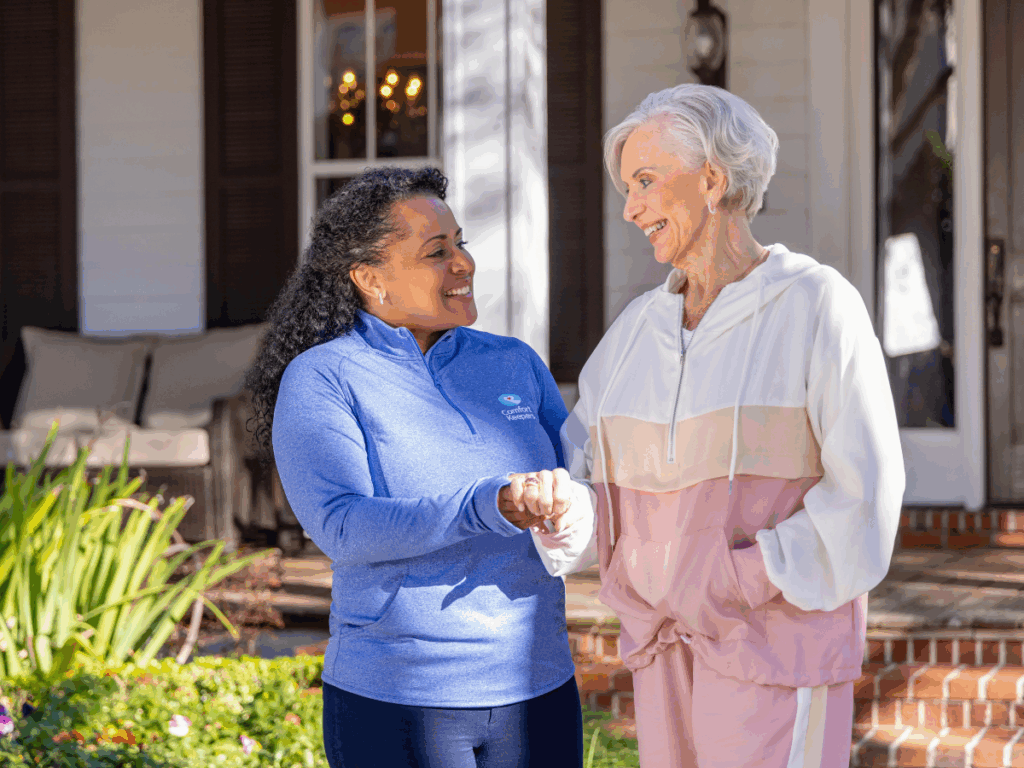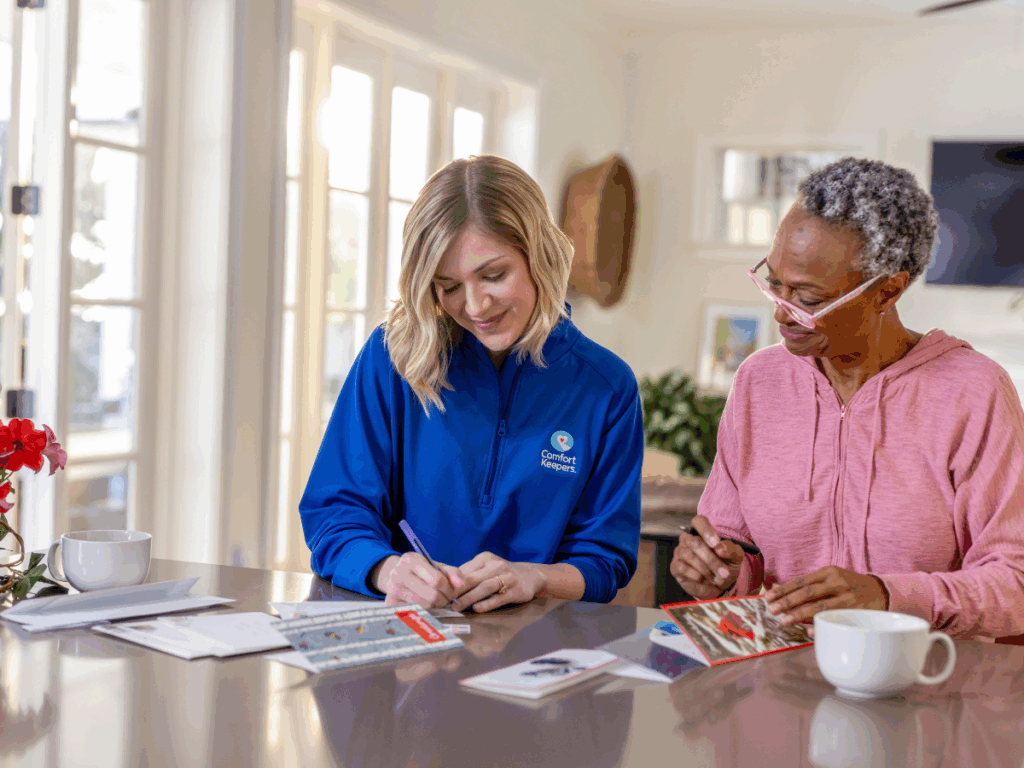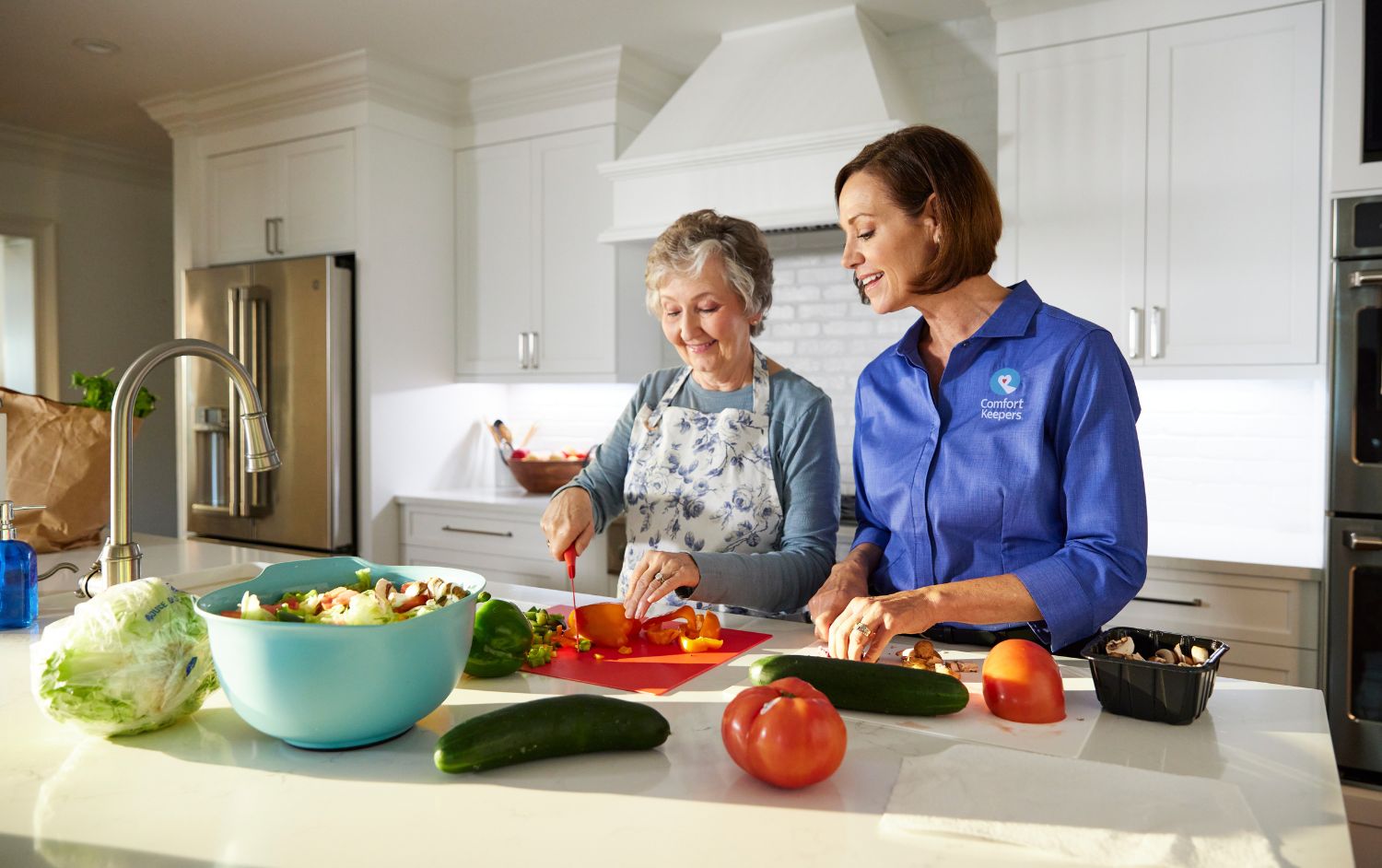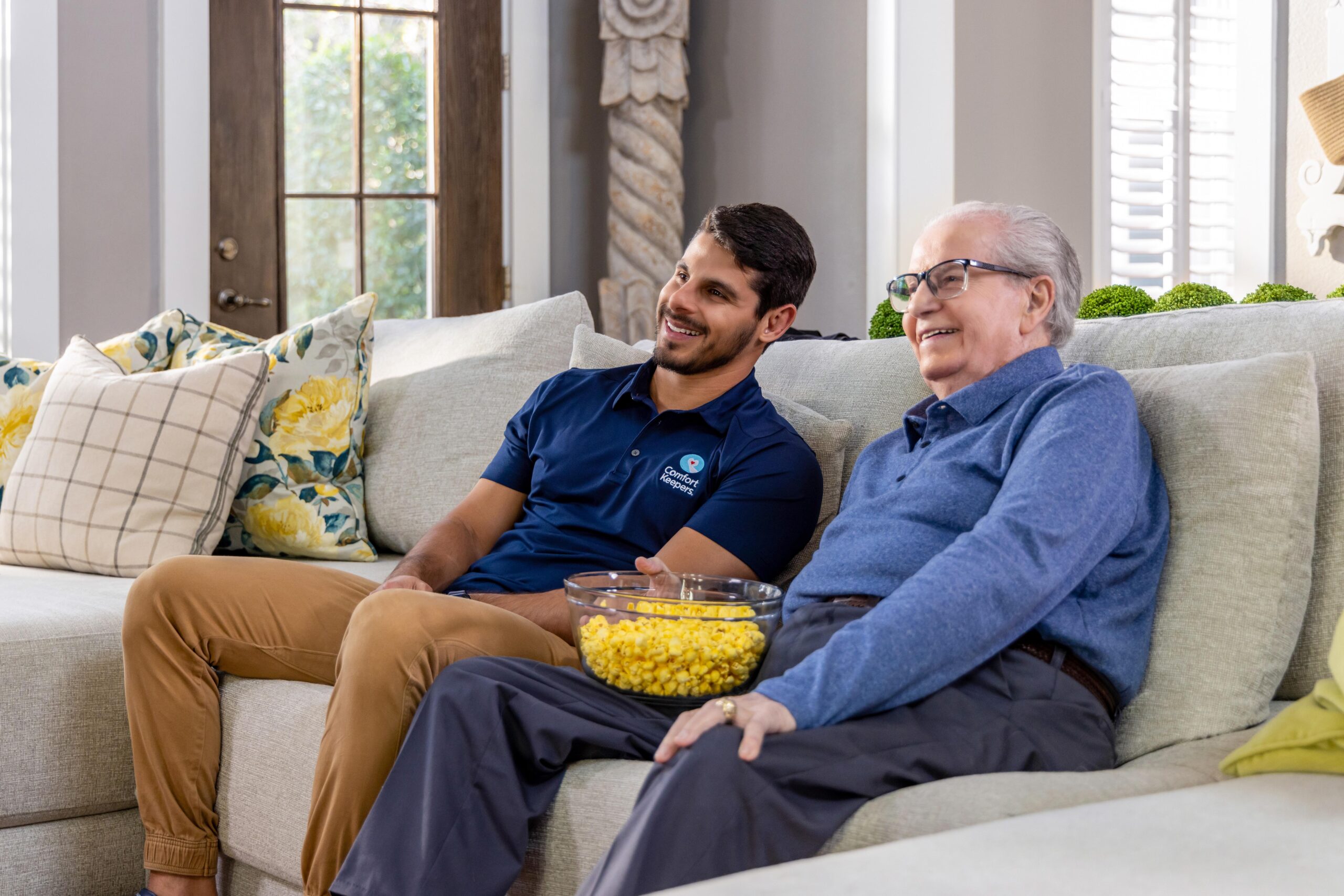Keeping Minds Bright: Simple Joys for Seniors at Home
TriCities Companion Care | October 20, 2025
Have you ever noticed your loved one seems a little quieter than usual, perhaps staring blankly, or struggling to remember a recent conversation? It’s a common worry for many families. We all want our seniors to stay engaged, vibrant, and connected to the world around them. While physical health often takes center stage, the health of the mind is just as crucial for a fulfilling later life.
Imagine a warm, sunny afternoon. Instead of quiet boredom, your loved one is animated, sharing stories prompted by an old photo album or laughing over a simple riddle. These aren’t just pleasant moments; they’re vital sparks for their brain, keeping their mind sharp and spirits high. The good news? Keeping a senior’s mind active at home doesn’t require complex gadgets or expensive programs. Often, the most powerful tools are right at your fingertips – simple activities that weave into daily life and bring genuine joy.

The Amazing Power of an Active Mind: More Than Just Memory
When we talk about keeping the mind active, we’re delving into something called cognitive stimulation. Think of it as a workout for the brain! Just like your muscles get stronger with exercise, your brain benefits from regular mental challenges. It’s about engaging different parts of the brain to improve memory, problem-solving skills, attention, and even language abilities.
One of the biggest misconceptions is that significant memory loss is just a normal part of aging. While some cognitive changes are natural, persistent or severe memory issues and difficulty performing daily tasks are not. The Alzheimer’s Society clarifies that while some cognitive decline can be normal, it’s important to understand the difference between typical age-related changes and more serious conditions like dementia.
But here’s the real “aha!” moment: your brain has an incredible superpower called cognitive reserve. Imagine your brain is a city, and cognitive reserve is the number of roads and backup routes it has. The more you learn and engage your mind throughout life, the more roads you build. This extra network helps your brain function better and even cope if some of those roads get blocked by age-related changes or conditions. Research from institutions like Harvard Medical School and the NIH emphasizes that building cognitive reserves can significantly delay the onset of symptoms even if underlying brain changes are present. Every new activity, every new conversation, adds another road to that amazing city.
The benefits go far beyond just “improving memory.” An active mind contributes to:
- Elevated Mood: Combats boredom, loneliness, and feelings of isolation, which can often lead to depression.
- Increased Purpose: Engaging in meaningful activities gives seniors a sense of accomplishment and value.
- Stronger Social Connections: Many cognitive activities are inherently social, fostering bonding with family and caregivers.
- Greater Independence: A sharper mind often translates to better decision-making and the ability to manage daily tasks.
Easy Ways to Spark Joy and Keep the Brain Engaged
Ready to start building those cognitive roads? Here are some simple, at-home ideas that tap into different areas of the brain, making it fun and accessible for everyone.
Memory & Recall Boosters
These activities help keep those memory pathways well-trodden and vibrant.
- Photo Album Journeys: Sit together and flip through old photo albums. Ask open-ended questions like, “Who is this person?” “What was happening here?” “What do you remember about that day?” This isn’t just about names; it’s about invoking stories and emotions.
- “Remember When…” Stories: Start a sentence like, “Remember when we used to go to…” and encourage your loved one to finish the story or share their memories. This gentle recall is less about testing and more about shared connection.
- Simple Card Games: Games like “Go Fish,” “Old Maid,” or even a simple matching game can stimulate memory and attention without being overwhelming.
Problem-Solving & Logic Fun
These activities challenge the brain to think critically and strategize.
- Jigsaw Puzzles: Start with puzzles with larger pieces (50-100 pieces) and clear images. The act of finding, rotating, and placing pieces works on visual-spatial skills and problem-solving.
- Riddles & Brain Teasers: A quick online search can yield countless simple riddles that are fun to solve together.
- Board Games: Classic games like checkers, dominoes, or even simple bingo can be fantastic for strategic thinking and decision-making.
Language & Verbal Adventures
Engaging with words keeps communication skills sharp and expands vocabulary.
- Read Aloud: Take turns reading from a newspaper, a favorite book, or a magazine. Discuss the articles or story afterward.
- Word Games: Crossword puzzles (even beginner levels), word searches, or a game of Scrabble (even if you just focus on spelling words with available letters) are excellent.
- Learn a Few New Words: Pick a “word of the day” from a dictionary or an app like Duolingo (as recommended by A Place for Mom for learning new skills). Discuss its meaning and try to use it in conversation.
Creative & Expressive Arts
Artistic endeavors tap into different neural networks, fostering self-expression and fine motor skills.
- Colouring Books: Adult colouring books with intricate designs or simpler children’s colouring books can be incredibly soothing and engaging.
- Simple Drawing: Provide paper and pencils, and suggest drawing a familiar object, a pet, or a scene from memory.
- Listen to or Play Music: Put on their favorite music and encourage singing along or tapping their feet. If they used to play an instrument, even gently touching it or recalling tunes can be stimulating.
Movement with a Mental Twist
Physical activity isn’t just for the body; it’s a powerful brain booster! The Mayo Clinic and Harvard Medical School consistently highlight that physical activity increases blood flow to the brain, which helps keep memory sharp and supports overall cognitive function.
- Chair Yoga or Gentle Dance: Follow along with online videos designed for seniors. The sequences and coordination required provide both physical and mental stimulation.
- Gardening: Even small container gardening on a patio or windowsill involves planning, gentle movement, and sensory engagement.
- Sequence Exercises: Create a simple sequence of movements (e.g., “touch your nose, clap twice, raise your hands”) and ask them to repeat it.
Social Connection & Purpose
Isolation is a significant risk factor for cognitive decline. Engaging with others is paramount.
- Family Discussions: Dedicate time for open conversations about current events, family news, or even planning a simple meal together.
- Virtual Visits: Use video calls to connect with distant family and friends. Seeing faces and hearing voices make the interaction richer.
- Light “Volunteering”: Could they call a friend who might be lonely? Help sort old photos for a family project? Offer advice on a topic they’re knowledgeable about? Giving seniors a sense of purpose is incredibly powerful.

Making it Stick: Tips for Caregivers
As a caregiver, you’re the engine behind these wonderful activities. We understand it’s not always easy, and sometimes seniors may resist. Here are a few tips to help you succeed:
- Start Small and Keep it Fun: Don’t force activities. Introduce them gently. If your loved one seems frustrated or uninterested, try something else or take a break. The goal is enjoyment, not perfection.
- Tailor to Their Interests and Abilities: What did they enjoy throughout their life? A former carpenter might enjoy sorting tools or a simple building kit. A history buff might love documentaries or discussing historical events.
- Adapt as Needed: If a puzzle is too hard, remove some pieces or offer more clues. If reading is difficult, read to them. The key is to meet them where they are.
- Integrate Technology: Devices like the GrandPad are designed specifically for seniors, offering easy access to video calls, games, photos, and music, keeping them connected and entertained.
- Be Patient and Positive: Your encouragement can make all the difference. Celebrate small victories and focus on the shared experience.
When to Seek Professional Guidance
While these at-home activities are incredibly beneficial, it’s important to know when to seek professional advice. If you notice significant or rapid changes in memory, judgment, language, or daily functioning that interfere with independence, it’s time to consult a doctor. They can help determine the cause and recommend appropriate next steps. Resources like the Alzheimer’s Society can also provide valuable information and support.
Sometimes, families need an extra hand to ensure their loved ones receive consistent, engaging care. In-home care services, like those offered by Comfort Keepers Tricities, can provide professional caregivers trained in cognitive engagement techniques, offering both mental stimulation and companionship.
Your Questions Answered: FAQs about Senior Mental Activity
Q: What exactly is “cognitive stimulation?”
A: Cognitive stimulation refers to engaging the brain through various activities designed to exercise different mental functions like memory, problem-solving, language, and attention. It’s like a brain workout to keep it sharp and responsive.
Q: How do I know if an activity is actually “working” or helping?
A: Look for signs of engagement, enjoyment, and sustained attention. You might notice small improvements in memory recall, quicker processing, or simply a brighter mood and increased conversation. Even if there aren’t dramatic cognitive changes, the social and emotional benefits are significant indicators of success.
Q: What if my loved one resists doing activities?
A: Don’t push too hard. Try different types of activities, or frame them as a casual conversation or shared pastime rather than a “brain exercise.” Involve them in choosing the activity. Sometimes, trying at a different time of day when they are more alert can help. Patience and flexibility are key.
Q: Are brain training apps effective for seniors?
A: While apps can be a fun way to engage the mind, research on their long-term effectiveness in preventing cognitive decline is mixed. However, they can certainly help with specific skills like memory or attention in the short term and provide enjoyable mental engagement. Combined with other activities and social interaction, they can be a good part of a holistic approach.
Q: How much time should we spend on these activities each day?
A: There’s no magic number. Even short, consistent bursts of mental activity (15-30 minutes, a few times a day) are beneficial. The goal is regular engagement, not exhausting marathon sessions. Listen to your loved one’s cues and adjust accordingly.
Next Steps: Keep Learning and Connecting
Keeping a senior’s mind active at home is a journey filled with opportunities for connection, joy, and meaningful engagement. By understanding the power of cognitive stimulation and embracing these easy, at-home activities, you can help your loved one maintain their independence, enhance their quality of life, and keep their spirit vibrant.
Ready to make a personalized plan? Check out: How to Choose the Right In-Home Senior Care Agency in Tri-Cities: A Checklist for Families. It is a comprehensive guide to integrating these ideas into daily life. Remember, every little bit of engagement makes a big difference.
The Best, Expert Senior Home Care in Tri-Cities, British Columbia is Comfort Keepers® Coquitlam
At Comfort Keepers®, we provide personalized, compassionate in-home care services for seniors in Tri-Cities of Coquitlam, Port Coquitlam (PoCo), Port Moody, Anmore, and Belcarra, BC.
We proudly support thousands of families each year with home health care services—helping loved ones remain safe, happy, and independent in the homes they love.
Elderly Care at Home: Home is The Best Place to Be
Providing care for an aging parent or loved one can be both fulfilling and incredibly demanding, especially for family members balancing careers and busy households. That’s where we come in.
Comfort Keepers® Tri-Cities offers professional, flexible care solutions that lighten the load for families and give everyone peace of mind—knowing their loved one is in good hands.
We offer a range of services that include companionship care for seniors, personal care services, non-medical homecare and Tri-Cities respite care.
Comfort Keepers® Tri-Cities Can Help with Companion Care and Interactive Caregiving™
At Comfort Keepers® Coquitlam, we believe in more than just meeting physical needs. The team at Comfort Keepers® elevates the human spirit. Trained caregivers build meaningful relationships, bring joy into everyday moments, and provide support that goes beyond routine care.
Our senior homecare caregivers help provide our elderly clients with personal home care to help maintain the highest possible quality of life. Caregivers deliver Interactive Caregiving™, a system of care that addresses safety, nutrition, mind, body, and activities of daily living (ADLs).
Comfort Keepers® Tri-Cities Provides Home Care and a Wide Range of In-Home Care Services for Seniors.
Are you looking for reliable home care in the Tri-Cities of Coquitlam, Port Coquitlam (PoCo), Port Moody, Anmore, and Belcarra?
Learn more about our unique service, which offers personal care, companionship care, palliative and end-of-life care.
Contact the Comfort Keepers® Tri-Cities office today to schedule a free in-home consultation. Let us show you how our care can make a meaningful difference in your loved one’s life.
Individualized Home Care Options
Long-Term Home Care, 24 Hour Home Care & Short Term Care Options Customized for You







